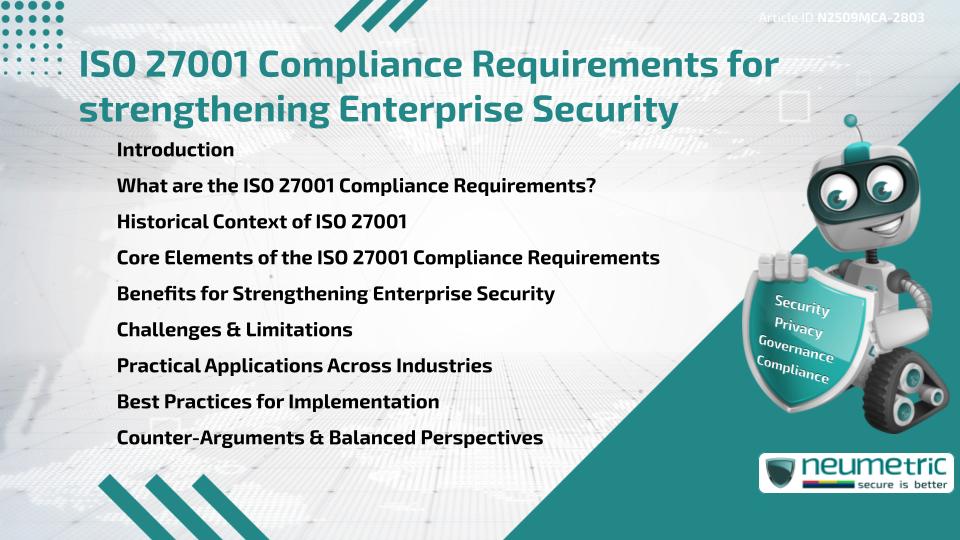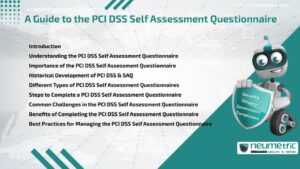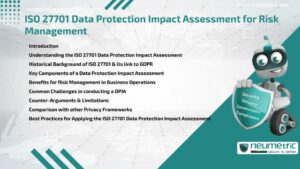Table of Contents
ToggleIntroduction
The ISO 27001 Compliance Requirements form the foundation of Information Security management for enterprises. They provide a systematic approach to protecting Sensitive Data, managing Risks & ensuring compliance with global security standards. By implementing these requirements, Organisations can strengthen enterprise security, build Stakeholder trust & reduce Vulnerabilities in an increasingly digital landscape.
What are the ISO 27001 Compliance Requirements?
The ISO 27001 Compliance Requirements are a set of guidelines & controls designed to establish, implement, maintain & improve an Information Security Management System [ISMS]. They cover Policies, processes & technical safeguards that ensure the confidentiality, integrity & availability of information assets. Organisations adopting these requirements can demonstrate compliance with international standards & regulatory obligations.
Historical Context of ISO 27001
ISO 27001 was first introduced in 2005, building upon the earlier British Standard BS 7799. Over time, it evolved to reflect the growing complexity of Cyber Threats & the increasing importance of global Data Protection regulations. Today, iso 27001 Compliance Requirements are widely recognized as the benchmark for effective Information Security management.
Core Elements of the ISO 27001 Compliance Requirements
- Risk Assessment & treatment: Identifying & mitigating potential Vulnerabilities.
- Security Policies: Defining organisational rules for Information Security.
- Asset management: Ensuring protection of data assets throughout their lifecycle.
- Access Control: Regulating User access based on business needs.
- Incident management: Preparing for & responding to security breaches.
- Business Continuity: Ensuring resilience against disruptions.
- Continuous Improvement: Regularly reviewing & enhancing Security Measures.
Benefits for Strengthening Enterprise Security
Adopting ISO 27001 Compliance Requirements provides enterprises with:
- A structured Framework for managing Risks effectively.
- Stronger defense against data breaches & cyberattacks.
- Improved alignment with regulatory requirements such as GDPR & HIPAA.
- Greater Stakeholder confidence in organizational security.
- Simplified audits through standardised documentation & reporting.
Challenges & Limitations
Implementation can be resource-intensive, requiring significant investment in time, training & expertise. Smaller enterprises may find compliance challenging due to limited budgets. Additionally, strict adherence without flexibility can sometimes reduce agility in rapidly changing business environments.
Practical Applications Across Industries
- Finance: Protecting Customer Financial data & ensuring compliance with PCI DSS.
- Healthcare: Safeguarding Patient Records in line with HIPAA.
- Technology: Securing Intellectual Property & cloud infrastructures.
- Retail: Protecting Consumer Data in digital & in-store transactions.
- Education: Ensuring security of student & research data.
Best Practices for Implementation
- Conduct a thorough Gap Analysis before adopting controls.
- Involve leadership & staff across departments in compliance efforts.
- Map requirements to existing Policies & regulatory frameworks.
- Use automation for monitoring & reporting to improve efficiency.
- Review & update ISMS regularly to address new Risks.
Counter-Arguments & Balanced Perspectives
Critics argue that focusing heavily on ISO 27001 Compliance Requirements may encourage a checklist-driven culture rather than a proactive security mindset. Others caution that Certification alone does not guarantee resilience against Cyber Threats. Supporters, however, emphasize that ISO 27001 provides a strong foundation for enterprises, which, when combined with adaptive practices, results in stronger overall security.
Takeaways
- Provides a structured Framework for enterprise Information Security.
- Aligns with global regulations to reduce compliance Risks.
- Builds Stakeholder trust through Transparency & Accountability.
- Strengthens resilience with proactive Risk Management.
- Works best when combined with flexible & adaptive security practices.
FAQ
What are the ISO 27001 Compliance Requirements?
They are a set of structured guidelines & controls for establishing & managing an ISMS.
Why are they important for enterprises?
They help strengthen enterprise security, reduce Risks & ensure compliance with global regulations.
Who uses ISO 27001 Compliance Requirements?
Enterprises across industries such as Finance, Healthcare, retail & technology use them to manage Information Security.
What challenges do Organisations face in adopting them?
Challenges include high implementation costs, resource needs & balancing flexibility with compliance.
Do the requirements guarantee Data Security?
No, they reduce Risks but must be combined with strong Governance & proactive practices.
How do they help with audits?
They provide structured documentation & standardised processes that make audits more efficient.
Need help for Security, Privacy, Governance & VAPT?
Neumetric provides organisations the necessary help to achieve their Cybersecurity, Compliance, Governance, Privacy, Certifications & Pentesting needs.
Organisations & Businesses, specifically those which provide SaaS & AI Solutions in the Fintech, BFSI & other regulated sectors, usually need a Cybersecurity Partner for meeting & maintaining the ongoing Security & Privacy needs & requirements of their Enterprise Clients & Privacy conscious Customers.
SOC 2, ISO 27001, ISO 42001, NIST, HIPAA, HECVAT, EU GDPR are some of the Frameworks that are served by Fusion – a SaaS, multimodular, multitenant, centralised, automated, Cybersecurity & Compliance Management system.
Neumetric also provides Expert Services for technical security which covers VAPT for Web Applications, APIs, iOS & Android Mobile Apps, Security Testing for AWS & other Cloud Environments & Cloud Infrastructure & other similar scopes.
Reach out to us by Email or filling out the Contact Form…





